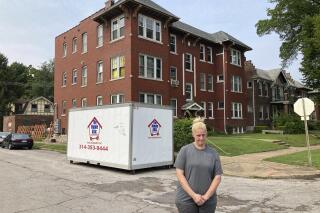Moratorium’s end may mean thousands of Missouri evictions

Kristen Bigogno stands in front of her St. Louis apartment on July 30, 2021. A storage trailer sits behind her. Bigogno expects to be evicted, along with her two teenage sons, soon after the federal moratorium ends after Saturday. She says they have no place to go and may face homelessness.(AP Photo by Jim Salter)
ST. LOUIS (AP) — Kristen Bigogno knows that with the end of the federal eviction moratorium, she and her two teenage sons could be forced out of their St. Louis apartment any day now, with no place to go.
“My kids don’t want to be homeless,” Bigogno, 39, said. “If we don’t have a place, we’ll be in a tent. We don’t have anybody. We have each other.”
Across Missouri, thousands of families face potential eviction with the expiration of the federal moratorium imposed in September by the U.S. Centers for Disease Control and Prevention. The freeze, which expires as of Sunday, was meant to provide relief to tenants unable to keep up with their rent during the coronavirus pandemic and to prevent further spread of COVID-19 by people put out on the streets and into shelters.
In St. Louis, the sheriff’s office handles court-ordered evictions. Sheriff Vernon Betts said 126 evictions have been ordered and are just waiting for the moratorium to end. His office plans to enforce about 30 evictions per day starting Aug. 9.
Betts knows there will be hundreds of additional orders soon. He’s already been contacted by countless landlords who haven’t yet filed for eviction, but plan to.
“Once the moratorium is over, I’m thinking it’s going to be, ‘Katy bar the door,’” Betts said.
The CDC moratorium was initially scheduled to expire at the end of June. The Biden administration extended it by a month.
The administration said Thursday it would allow the moratorium to expire this time, arguing that its hands were tied by a Supreme Court ruling that made clear further extensions wouldn’t be allowed without congressional authorization. House members tried unsuccessfully on Friday to pass a bill to extend the moratorium.
More than 13,000 eviction cases have been filed against tenants in Missouri’s two metropolitan areas since March 15, 2020, according to the Eviction Lab at Princeton University, which tracks evictions nationwide. That includes nearly 8,300 filings in St. Louis city and county combined, and more than 5,100 in Jackson County.
Robert Swearingen, an attorney for Legal Services of Eastern Missouri, worries that many people removed from their homes will struggle to find new housing.
“My clientele is really low-income so I’m dealing with people living on Social Security between $600 and $1,000 a month, and they have a hard time finding a apartment that is livable,” Swearingen said.
Kennard Williams, a housing activist with the group Action St. Louis, said that with housing insecurity already alarmingly high in St. Louis, “the eviction wave is going to overwhelm the resources and infrastructure that we have.”
“A lot of people don’t have a plan, and with the way evictions work, once you have an eviction on your record, a lot of landlords will bar you from living on their property,” Williams said. “We’re looking at a lot of people facing homelessness.”
Lee Camp, an attorney at ArchCity Defenders, agreed. A “homelessness crisis,” he said, “is exactly where we’re headed.”
The pandemic has hurt landlords, too. Nick Kasoff rents out more than a dozen homes in the St. Louis suburb of Ferguson. He’s doing OK, but he knows many other small-time landlords who are in financial trouble. He expects a surge in foreclosures of rental properties.
“If you’re a landlord and you’ve got tenants who won’t pay and you’ve got no way of removing them from the property, what are you going to do?” Kasoff asked.
Bigogno and her sons, ages 16 and 17, have lived in their south St. Louis apartment for five years. She said she’s always paid her rent on time. She had a good job working for a company that delivers meals to homebound senior citizens.
Her trouble began earlier this year, and is not related to the pandemic. The company that owns her six-unit building and two neighboring four-unit complexes began evicting tenants with plans to rehab the buildings and rent them at higher prices, Bigogno said. She said the company sought to evict her and refused to accept her rent payments.
Activists with the group Homes for All St. Louis convinced a judge that her case was covered by CDC guidelines, and her eviction was delayed until the moratorium’s end.
The months-long court fight meant time away from work. Bigogno lost her job because of it, she said.
Bigogno dreads the day when deputies knock on her door.
“I’m scared,” she said. “I’m terrified that every day will be the day. I pray to God, ‘please let today not be the day.’”
